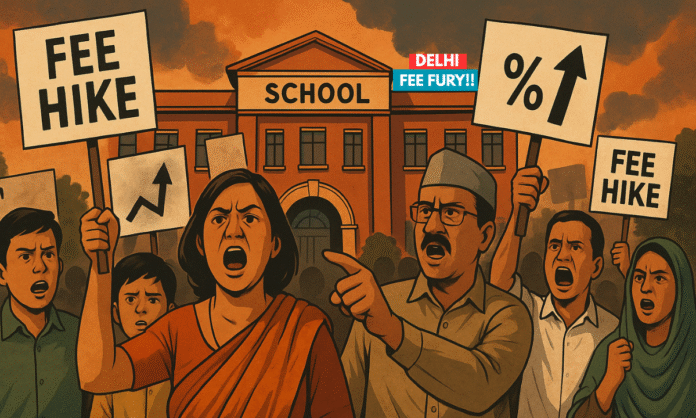SUMMARY
- Delhi parents face steep hikes in school fees — up to 52% in one year — amid salary stagnation post-Covid.
- HC’s 2024 ruling limiting DoE’s role has allowed over 390 schools on DDA land to hike fees without prior approval.
- BJP, AAP spar over accountability as audits, protests, and legal battles intensify across the capital.
The Middle-Class Crunch: School Fees vs. Survival
In Vasant Vihar, a 42-year-old government employee spends ₹34,000 every month — nearly half her ₹80,000 salary — on educating her two daughters at Chinmaya Vidyalaya. Since the pandemic, she’s been running her household alone, with her husband working in another city.
This April, her financial burden worsened. The school raised its monthly fee for Class 11–12 Science students to ₹13,728, up from ₹8,975 — a 52% increase in just one year.
“It’s like a lock-in once they reach Class 9,” she said. “Switching schools at this stage isn’t realistic.”
She isn’t alone. Parents across Delhi have taken to the streets, protesting what they call arbitrary, unjustified fee hikes in private schools. For many, this is more than an affordability crisis — it’s a structural failure born out of regulatory paralysis.
🚨 Despite CM @gupta_rekha Mam strict warning to private schools over arbitrary fee hikes, there seems to be *no fear* among school owners or the DoE. Parents continue to suffer. Will the govt walk the talk or was it just another headline? #DelhiSchools #FeeHike https://t.co/hyOGogUnd5 pic.twitter.com/UcGO738Qxw
— Geet Sethi (@GeetSethiS) April 17, 2025
Fee Hike Flashpoint: The Delhi High Court Order
- In April 2024, the Delhi High Court issued an interim order, easing fee regulation for private schools on DDA-allotted land.
- Schools no longer need DoE approval to raise fees — only to submit a fee statement under Section 17(3) of the DSEAR, 1973.
- The DoE can act only in cases of profiteering or capitation fees.
This legal shift affected 394 schools, triggering a domino effect: 10% to 45% hikes across institutions like DPS Dwarka, Chinmaya Vidyalaya, BVN, and Queen Mary’s School.
At DPS Dwarka, fees increased consecutively by 20%, 13%, 9%, 8%, and 7% from 2020 to 2025, touching ₹1.4 lakh annually. An inspection committee found the school had even isolated children of fee-defaulters — barring them from canteens and segregating them in libraries.
On April 16, the Delhi High Court slammed the school for behaving like a “money-making machine.”
Systemic Strain: From Chinmaya to Queen Mary’s
- Chinmaya Vidyalaya says it’s financially strained, unable to meet 7th Pay Commission obligations without raising fees.
- At Birla Vidya Niketan, the development fee shot up 300%, only to be revised after backlash.
- QMS Model Town raised annual fees from ₹1.02 lakh to over ₹1.35 lakh; parents say total yearly costs now cross ₹2.5 lakh, including digital devices, uniforms, trips.
- One parent cited a ₹3 lakh bill for a US school trip and another ₹15,000 for a trip to Jim Corbett.
Parents argue they’re not against hikes per se — they demand transparency, uniformity, and consultation, not “shock fee slips” sent on the eve of a new quarter.
Political Crossfire: BJP vs AAP
The issue has exploded into a political firefight:
- CM Rekha Gupta’s BJP government has ordered audits across all 1,677 recognised private schools and issued show-cause notices to 11 institutions.
- Education Minister Ashish Sood calls this “historic accountability,” blaming AAP for auditing only 75 schools a year.
- AAP’s Saurabh Bharadwaj and Atishi hit back, accusing BJP of “hand-in-glove ties with school lobbies” and failing to appoint auditors.
As private schools cite inflation, CPC liabilities, and infrastructure costs to justify hikes, parents accuse the government of policy negligence.
What the Schools Are Saying
- DPS Dwarka says its hikes are tied to statutory compliances and CPC-linked salary revisions.
- AF Bal Bharati School (AFBBS) claims it had to implement a mid-session hike after DoE delays and years of restricted increases.
- Salwan Public School says its fee structure remained frozen from 2015 to 2023, forcing a 19% hike this year just to stay operational.
- Springdales, Pusa Road, kept its fee hike to 9% — “entirely need-based” — citing only teacher salaries and not development charges.
Schools argue they’re not profiteering but coping with rising operational costs — from AC systems and smart classrooms to new skill-based subjects requiring specialist trainers.
Legal and Ethical Deadlock: What Now?
- Under Section 17(3) of DSEAR, schools must submit proposed fees annually by March 31.
- Under Section 180, audited financials are due by July 31.
- DoE officials admit delays and incomplete disclosures from schools leave them with little actionable data.
Prof. R. Govinda, former NUPEA VC, says many School Management Committees (SMCs) are not transparent, and the system allows space for manipulation. Parents’ voices are often ignored, and DoE’s reach is limited.
Advocate Ashok Agarwal has demanded a comprehensive fee regulation law, highlighting that unaided private schools operate in a legislative grey zone.
Final Word: Parents Caught in the Crossfire
Whether it’s Rs 1.2 lakh or Rs 2.5 lakh, Delhi’s middle class is bearing the brunt of an education system that’s rapidly commercialising, with no salary hikes, inflation, and post-Covid economic strain.
There’s a legal battle still playing out: The Delhi government has filed a Letters Patent Appeal challenging the April 2024 HC order. Meanwhile, students are in classrooms, parents are on edge, and school corridors are haunted by a single question:
“Is private education in Delhi becoming unaffordable by design?”


